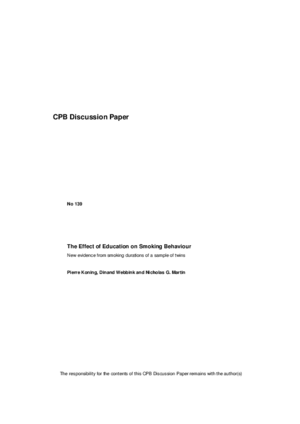The effect of education on smoking behaviour: New evidence from smoking durations of a sample of twins
Unobserved effects in the specification are assumed to be twin specific and possibly correlated with completed education years. In addition, we use various unique control indicators reflecting the discounting behaviour of individuals that may affect both the smoking decision and the number of education years.
In contrast to previous studies in our model specification, differences in the number of education years cannot explain differences in smoking behaviour at young ages. We find one additional year of education to reduce the duration of smoking with 9 months, but no significant effect of education on starting smoking. The effect of education on quitting smoking largely confines to male twins. This suggests that education policies that succeed in raising the level of education may improve public health through an increase of smoking cessation, but are not effective in preventing smoking at young ages.
